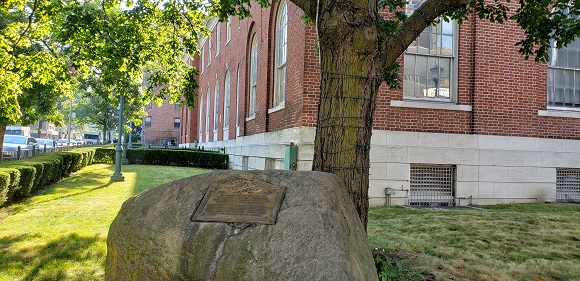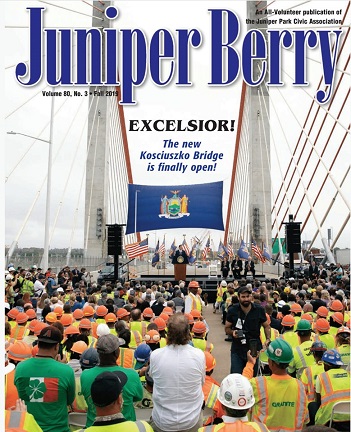On Saturday, May 26, 2019, I marched in Maspeth's Memorial Day Parade commemorating the 75th Anniversary of the Battle of Normandy. This year the weather was sweltering. As usual, I read a poem at the ceremony on Grand Avenue. Because I had visited Normandy and saw the beaches, the steep cliffs our soldiers had to climb in the face of enemy fire, this ceremony had special meaning. German machine gun nests and pillboxes were positioned on top of the cliffs, giving the enemy perfect fortification and position. The pillboxes were made out of thick concrete and steel and still remain intact today. I was stunned.
The Germans rained down machinegun fire on all sides, as our boys landed on the beaches and attempted to climb the cliffs. Having a vantage point, the Germans could easily mow down thousands of men before they get to the top. I wondered to myself how these young men could climb these steep cliffs, after making the run from the beach. Afterward, I visited the American Battle Monuments Cemetery in Normandy, France. There I saw thousands of white headstones, tombstones, as far as I could see in every direction, in front of me and all around me.
When I saw the raising of the flag and playing of taps, I started to tear up, as my knees began to give out. I sat on the floor next to a soldier's headstone, Isidor Weiss, N.Y.C, who died on my birthday June 8. There I wrote this poem:
Normandy, The Impossible Made Possible
Into the face of death, they forged our destiny,
Changing the course of history,
Climbing rope up steep, rugged cliffs like spiders,
Rushing into the volley they advanced.
As paratroopers dropped behind enemy lines
Like a heavy April rain,
And the Allies stormed the beaches like gladiators,
Forward! All- the-way-to-Germany
Notice the deep, dark craters that stamp time’s immortality.
All is quiet now,
Except crashing waves pounding against a rocky shore.
The day after the Maspeth parade was the official Memorial Day holiday, Monday, May 27, 2019. I just wanted to relax and view a parade. So, I got all dressed up in red, white, and blue, and drove to Little Neck and Douglaston Parkway in Queens with a vast 13 Stars and Stripes flag wearing a Revolutionary War era triangle hat. I parked my car several blocks from Northern Boulevard and I walked to the beginning of where the parade would start. Along the way, people stopped me, because I was dressed in red, white & blue, to ask if they could take my photo. Many people wanted group photos with me, too. As I was standing on the sidewalk, a reporter came up to me and took my picture and asked me why I was dressed so patriotically. I told him that was the least I can do to honor those who gave their all.
A parade staff person then walked up and asked me to march with my group. I said I was alone and not with any group. “You have to be in the parade dressed the way you are,” she said. “March behind any group.” I told her that Francis Lewis's ROTC was the school in which I once taught and that they were marching. She suggested I walk with them. So, as the Francis Lewis Marching Band passed, I stepped behind them and joined the parade in front of three officers.
Again, I was marching in a parade. I stayed until the end of the ceremony, and I was touched by all that I saw. Once back home in Flushing, I felt sad. I saw no signs of Memorial Day, no flags, no parades, no barbeques, no music, just people, many people, rushing to and fro. I don't know where they were going. They bump into you on the street and don't even say they are sorry. No community spirit.
In Maspeth, each soldier was acknowledged, saluted, prayed for, and thanked. To me, this was so touching. The warmth expressed in Maspeth that day was totally absorbing. People like Ken Rudzewick, and so many others from the community, who rallied to keep the spirit alive from generation to generation. Once home in Flushing, I thought about the great feelings of pride I had witnessed in the Maspeth and Little Neck-Douglaston Parades.
In Flushing, I remembered the soldiers who died in WWII, and who are now almost forgotten entirely. I remembered the boulder in front of the Main Street Post Office, on which is an engraved plaque, with all the names of those soldiers from Flushing killed in WWII. A wreath-laying ceremony was once performed every Memorial and Veteran's Days for decades. It was stopped in the late 1990s.
In Flushing, I realized our WWII soldiers who died in that struggle are not being acknowledged, honored, and respected. So, I thought I would walk to the Flushing Memorial Plaque, enclosed in a gate, on the side of the Post Office on the corner of Sanford Avenue and Main Street, where I would pay my respects, and give them tribute, say a prayer, and salute. No one seemed to notice me in my Revolutionary War uniform carrying my colonial flag as I walked down Main Street to the site.
I felt like a foreigner in my own country. Nevertheless, I walked up to the boulder and removed my triangular hat. Although I felt strange, I felt proud too. I remained with my head bowed down in a moment of silence. As I was praying, a man stood beside me, right next to me, a complete stranger, a Chinese immigrant. We stood there in prayer, both still, and saluted those fallen heroes from Flushing. I stood in silence afterward in which this man standing next to me struggled to say the words. In broken Chinese-English, he said, “I love America.” My eyes teared up, and I thanked him. Unbeknownst to me, this man has a massage chair on the corner of Main Street, and Sanford Avenue, right next to the boulder and plaque that is housed on the other side of the locked fence.
Here, this man gives a massage for $30 an hour, or half of the price for half of the time, and free for those who are handicapped. He whispered, “American you? I want to give you a free massage.” I said no, but I was tired and aching all over. So, when he motioned me to sit in the chair, I said to myself, “What the heck!” I sat in the chair, placed my head through a donut hole in the chair to rest.
What a great massage! I tried to pay him afterward, but he refused. I asked if he would be there for the next fifteen minutes. He did not understand. Since I lived next door, I went home to retrieve a Chinese-English dictionary and an American flag lapel pin. I returned to the spot to express my gratitude for the massage and gave him my gifts. He was delighted and very pleased. He thanked me profusely in Chinese. We shook hands. I bowed my head and walked home in my Revolutionary War uniform with my colonial flag.
So, it turns out that I was wrong. There are people in Flushing who remember and appreciate the fallen Americans of the town.



